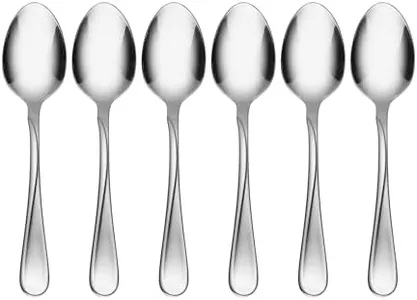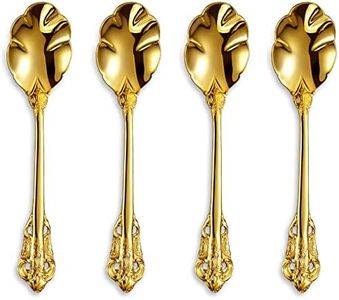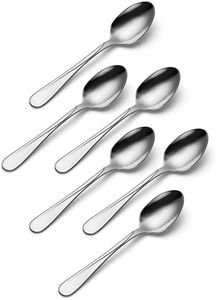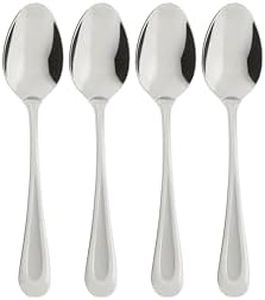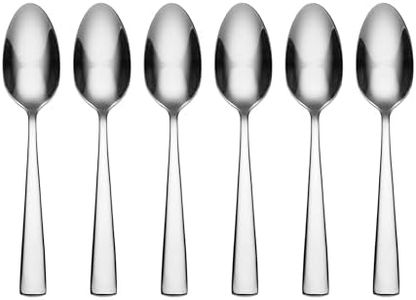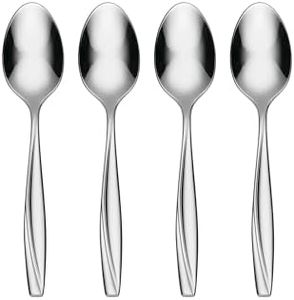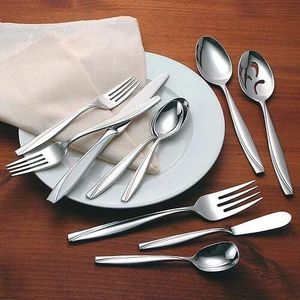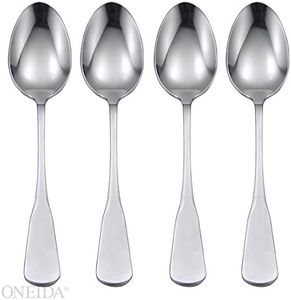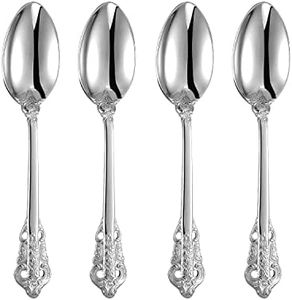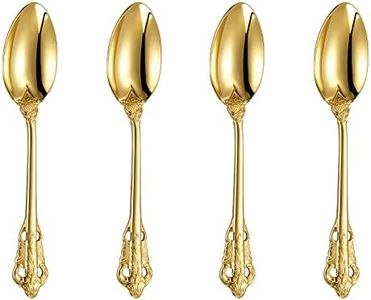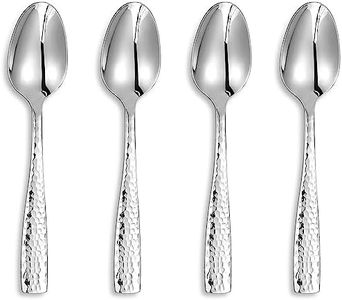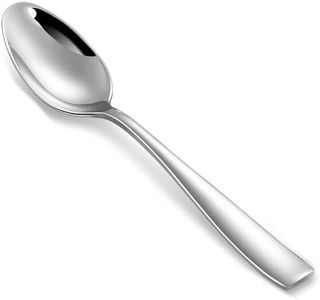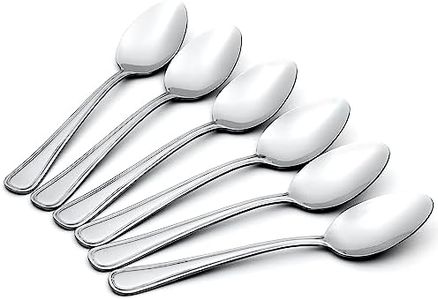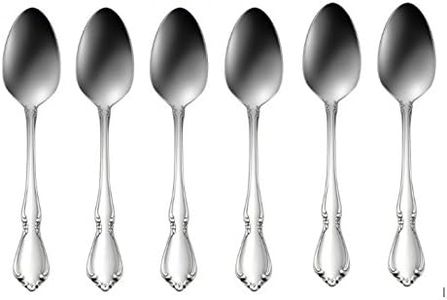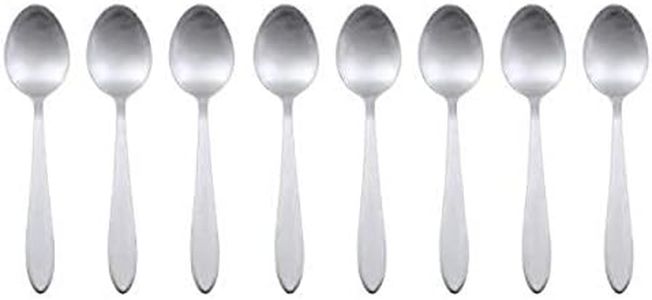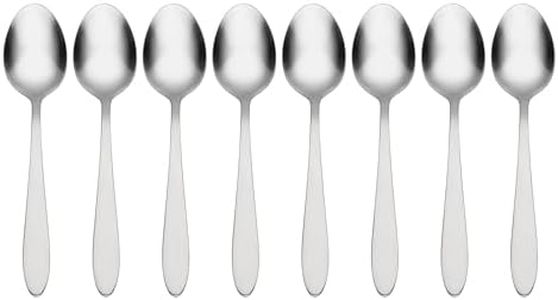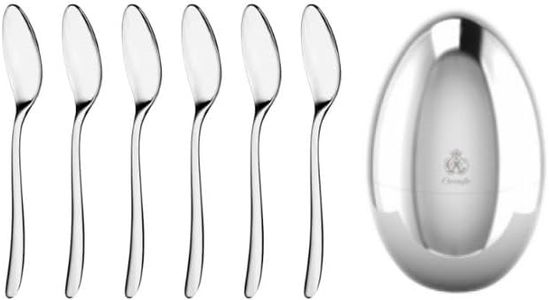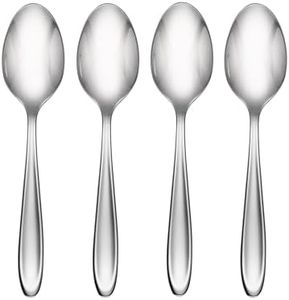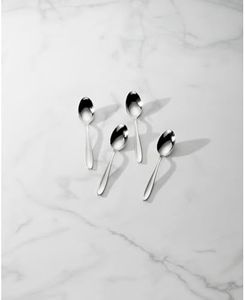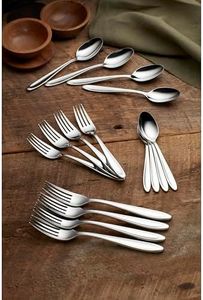We Use CookiesWe use cookies to enhance the security, performance,
functionality and for analytical and promotional activities. By continuing to browse this site you
are agreeing to our privacy policy
10 Best Spoons 2025 in the United States
#1
Winner
Oneida Flatware Flight, Teaspoons, Stainless Steel, Set of 6
The Oneida Flatware Flight teaspoons stand out for their mid-century elegant design, featuring smooth and flowing lines reminiscent of the 1950s. Made from high-quality 18/0 stainless steel, these spoons offer durability and rust resistance, making them suitable for everyday use. They are designed to be dishwasher safe, which adds to the convenience of maintenance.
Rating
9.7
Chosen by1,264
Size
Most important from
2053 reviews
Top 10 Best Spoons 2025 in the United States
#1
Winner
9.7 score
Oneida Flatware Flight, Teaspoons, Stainless Steel, Set of 6
Oneida Flatware Flight, Teaspoons, Stainless Steel, Set of 6
Material: 18/0 Stainless Steel
Size: 1.65 x 2.2 x 9.92 inches
Handle Length: 2.2 inches
Design and Aesthetics: Mid-century elegant design, mirror finish
Chosen by 1264 this week
Christofle Mood 7-Piece Silver Plate Espresso Spoon Set #0065636
Christofle Mood 7-Piece Silver Plate Espresso Spoon Set #0065636
Material: silver plate
Size: 5.1 inches
Shape: egg-shaped
Design and Aesthetics: classic
How do we rank products for you?
Our technology thoroughly searches through the online shopping world, reviewing hundreds of sites. We then process and analyze this information, updating in real-time to bring you the latest top-rated products. This way, you always get the best and most current options available.

Buying Guide for the Best Spoons
Choosing the right spoon may seem like a simple task, but there are several factors to consider to ensure you get the best fit for your needs. Spoons come in various shapes, sizes, and materials, each designed for specific purposes. Understanding these key specifications will help you make an informed decision and select the perfect spoon for your kitchen or dining needs.MaterialThe material of a spoon is crucial as it affects durability, weight, and suitability for different types of food. Common materials include stainless steel, plastic, wood, and silicone. Stainless steel is durable and resistant to rust, making it ideal for everyday use. Plastic spoons are lightweight and often disposable, suitable for picnics or casual gatherings. Wooden spoons are gentle on cookware and great for cooking, while silicone spoons are heat-resistant and flexible, perfect for non-stick pans. Choose a material based on your primary use and preference for durability and maintenance.
SizeSpoons come in various sizes, each designed for specific tasks. Teaspoons are small and typically used for stirring tea or coffee and measuring ingredients. Tablespoons are larger and used for serving or eating meals. Serving spoons are even bigger and designed for dishing out food at the table. Consider what you will primarily use the spoon for and select the size that best fits that purpose. For example, if you need a spoon for cooking, a larger serving spoon might be ideal, while a teaspoon is perfect for measuring small quantities.
ShapeThe shape of a spoon can affect its functionality. Spoons with a round bowl are great for soups and stews, while those with an oval or pointed bowl are better for scooping and serving. Some spoons have a flat edge, which can be useful for scraping the bottom of pots and pans. Think about the types of dishes you prepare most often and choose a spoon shape that complements those tasks. For instance, if you frequently make soups, a round-bowled spoon would be a good choice.
Handle LengthThe length of the handle is important for comfort and practicality. Short-handled spoons are easier to store and handle for everyday dining, while long-handled spoons are useful for stirring deep pots or reaching into tall containers. If you often cook large batches of food or use deep cookware, a long-handled spoon will be more convenient. For regular dining or serving, a standard handle length should suffice.
Design and AestheticsThe design and aesthetics of a spoon can enhance your dining experience and complement your table setting. Some spoons have intricate designs or patterns, while others are sleek and modern. Consider your personal style and the overall look of your kitchen or dining area when choosing a spoon. A well-designed spoon can add a touch of elegance to your meals and make everyday dining more enjoyable.
